A Delhi neighbourhood divided by a highway and now hatred
Fear and suspicion have replaced generally cordial relations between Hindus and Muslims in the Indian capital
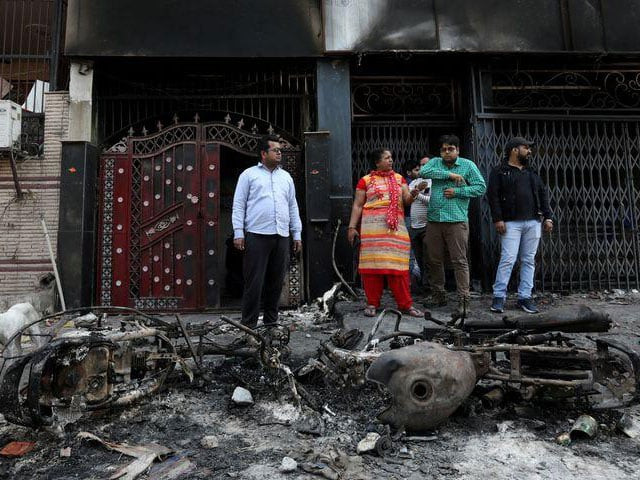
Fear and suspicion have replaced generally cordial relations between Hindus and Muslims in the Indian capital. PHOTO: REUTERS
After days of deadly riots between members of the two communities, neighbourhoods that lived happily together for years are now divided by far more than a road.
Mutual fear and suspicion have replaced generally cordial relations, a change that could make it harder to defuse tensions between India’s Hindu majority and its sizeable Muslim minority that have worsened during months of street protests.
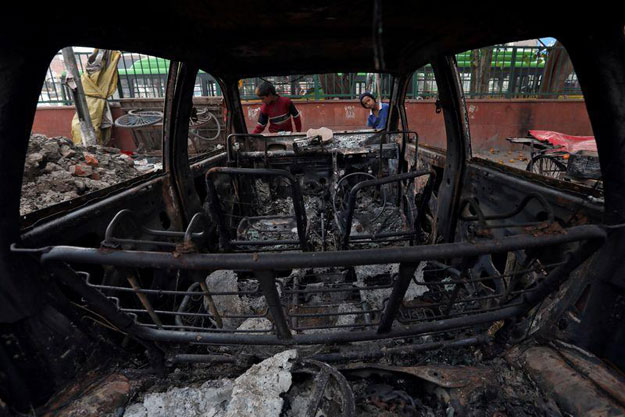 PHOTO: REUTERS
PHOTO: REUTERSSome residents are trying to understand how a peaceful part of the Indian capital became a battleground virtually overnight.
By midweek the main road was strewn with broken glass, bricks and the charred remains of destroyed cars.
At least 38 people died in the clashes, hundreds were wounded and buildings were torched in the worst sectarian violence in Delhi in decades. An uneasy calm had settled over the area by Thursday.
“I have lived here for 35 years,” said Santosh Garg, a Hindu who described a narrow escape on Monday when a mob of Muslim men set her house alight.
“I have never had a problem, never had a complaint,” the 52-year-old told Reuters, referring to her mostly Muslim neighbours across the way. “I still can’t understand what happened.”
Garg said she lowered her two grandchildren from a balcony and into the arms of police officers to get them away from the blaze. She herself jumped on to an adjoining terrace.
In the Muslim quarter a few hundred meters away, Rubina Bano said she was at an anti-government demonstration when police fired tear gas to break up the protest and a Hindu crowd started throwing stones.
Bano, who is three months pregnant, said she was beaten by police and needed 20 stitches in her head.
Delhi police did not respond to requests for comment for this story. On Tuesday evening, the force issued a statement saying it was doing its utmost to control the violence and urged people to maintain peace.
‘We must defend ourselves’
Like hundreds of thousands of Muslims across the country, Bano had spent weeks protesting against a new citizenship law that gives non-Muslims from three neighbouring countries a fast-track to Indian citizenship.
Tensions high in Delhi as death toll from riots rises to 38
Many Indians say the law is discriminatory and against the spirit of the country’s secular constitution. The country’s Muslims also fear that a proposed national citizens register could render many of them stateless.
Prime Minister Narendra Modi’s government, which critics say has pursued a stringent pro-Hindu agenda since being re-elected last year, says the new law is necessary to help persecuted minorities from Afghanistan, Bangladesh and Pakistan.
It also denies any bias against India’s Muslim population of more than 180 million people.
When protests began in December, clashes were mostly between anti-government demonstrators and police. At least 25 people died that month, mainly in the northern state of Uttar Pradesh.
This week in Delhi, the violence was largely between Hindus and Muslims, raising fears that large-scale communal bloodshed that has erupted sporadically since India’s independence could return.
In northeastern Delhi, the risk is clear. Tempers are running high even as riots subside.
Near a badly burned fuel station in Bhajanpura, a group of Hindu men fumed at the damage suffered by their community.
“If this is what the minority can do, wait till you see what the majority can do when it picks up arms,” Ajay Choudhary, a yoga instructor, loudly declared to applause and cheers, as he pointed to burned buildings.
India is 80 per cent Hindu, with Muslims making up 14 per cent of the 1.3 billion population.
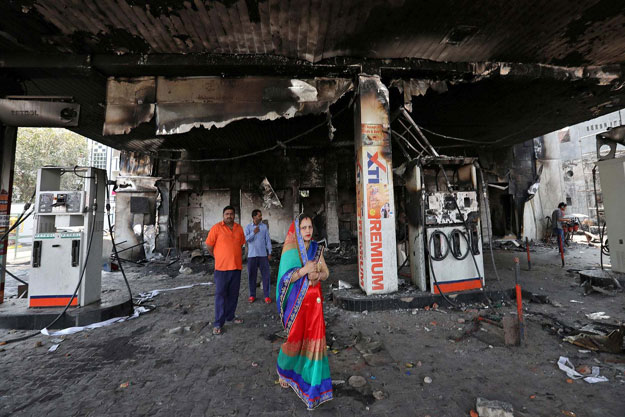 PHOTO: REUTERS
PHOTO: REUTERS“We had to do something to defend ourselves. They were lusting for blood,” said Ashish, a 21-year-old Hindu student who only gave his first name.
Lack of trust
Faith in the ability of politicians and police to contain the unrest is wearing thin among local residents.
“This is all the work of politicians who don’t want the communities to stay together,” said Bano, injuries visible on her head, arms and legs.
During recent local elections in Delhi, some members of the ruling Hindu nationalist Bharatiya Janata Party (BJP) described the protesters, most of them Muslims, as “traitors”.
Junior finance minister Anurag Thakur encouraged a crowd to chant “shoot the traitors” during a rally.
Amit Shah, India’s home minister and Modi’s right-hand man, criticized the remarks in an interview several weeks after his BJP party was routed in the New Delhi polls.
“These statements shouldn’t have been made. The party has distanced itself from such comments,” Shah said in an interview earlier in February.
On Thursday, another BJP leader, India’s Information and Broadcasting Minister Prakash Javadekar, said it was opposition parties that had fanned the violence during months of protests against the citizenship law.
OIC condemns 'anti-Muslim' violence in India
“This is not about the violence that’s gone on for two days. For two months, people have been provoked,” he said.
Some local residents pointed the finger at the police for failing to do enough to protect them from attack. The Delhi force is controlled by Shah’s Home Ministry.
Kalam Ahmed Khan, a Muslim in Chand Bagh, said police should have done more to prevent the clashes this week.
“All this has happened under the police’s nose,” he said.


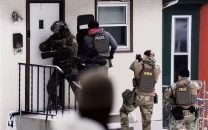

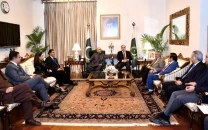
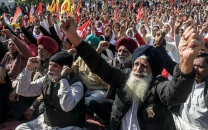
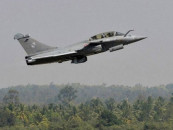












COMMENTS
Comments are moderated and generally will be posted if they are on-topic and not abusive.
For more information, please see our Comments FAQ